Why Hongkongers are retiring on the mainland, but it’s set to be a struggle for mainland seniors
While high costs in Hong Kong push seniors to seek a more affordable life in Guangdong, mainland residents must contend with the threat of inadequate pensions. CNA’s Money Mind looks at how retirement may impact various demographics in China.
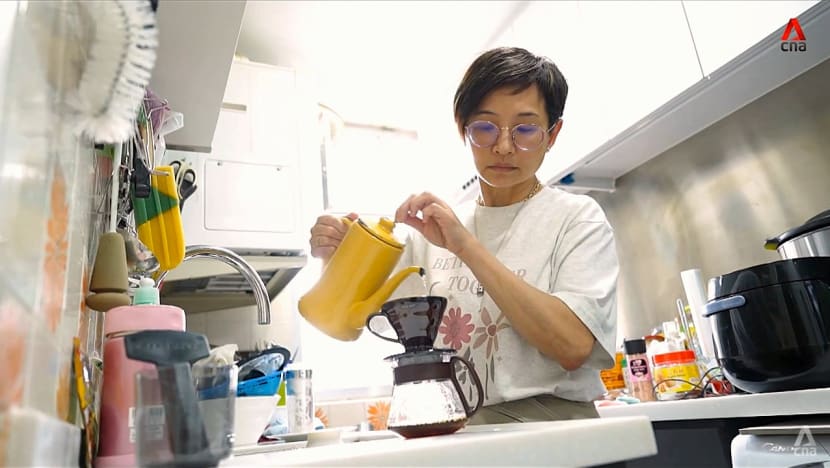
Mandy Lam, 58, worries that her income will not support a comfortable retirement in Hong Kong.

This audio is generated by an AI tool.
HONG KONG: For many Hongkongers, retirement is more about achieving financial stability than co-ordinating travel plans. Yet, many are finding a way to do both.
An increasing number of retirees are relocating to the mainland, where they can escape the high costs of living back home and stretch their dollars.
Mandy Lam, 58, is one who hopes to join their ranks. As a beautician, she earns between HK$20,000 (S$3,380) and HK$30,000 a month.
With daily expenditure of at least HK$500, however, and the occasional HK$1,000 splurge “on random things”, she worries as she nears the age of 65 that her income will not support a comfortable retirement in Hong Kong.
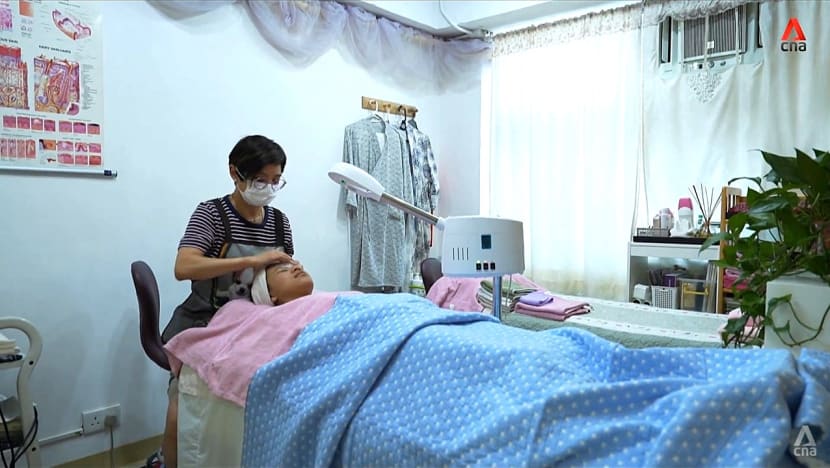
Her savings fall short of the amount she believes she will need — HK$3 million to HK$4 million — to cover housing and medical expenses in her later years.
Inflation is also putting a strain on her budget, with the ever-increasing cost of utilities, transport and food.
She remains hopeful of a change. “Having a million dollars in Hong Kong might be useless, but on the mainland, a million is different,” she said. “In the end, I don’t want to be like a calculator, counting every penny.”
While traditional elderly homes in Hong Kong can cost HK$8,000 to HK$14,000 per place per month, renting a two-bedroom apartment in some other cities in the Greater Bay Area can cost less than HK$3,000.
WATCH: More space, lower bills — Hong Kong residents are moving to retire in mainland China (7:32)
And over the last five years, the number of Hong Kong residents aged 65 and over living in Guangdong province grew by 11 per cent.
Like several of her friends, Lam is planning to relocate for a “trial period” first. “Within a year, I’ll know if I can adapt,” she said.
The programme Money Mind looks at some of the forces driving this trend on both sides of the border, plus the struggles mainland residents face with their own pension coverage.
NURSING CARE: FROM 16-MONTH WAIT TO 25 DAYS
One of the push factors in Hong Kong is a shortage of places at retirement homes.
“We have around 17,000 people on the waiting list for a nursing home in Hong Kong,” said Wendy Chan, a growth director at property consultancy JLL Greater China.
“So it takes (an average of) 12 to 16 months for them to wait.”
These queues are only expected to stretch longer. More than a fifth of Hong Kong’s 7.5 million residents are already aged 65 and older. By 2050, the city will have the world’s oldest population, predicts the United Nations.
There are policies, however, that allow eligible Hongkongers to apply for placement in designated elderly homes in cities in Guangdong, with monthly fees as low as 2,000 yuan (S$370). “Most importantly, the waiting time is 25 days,” said Chan.
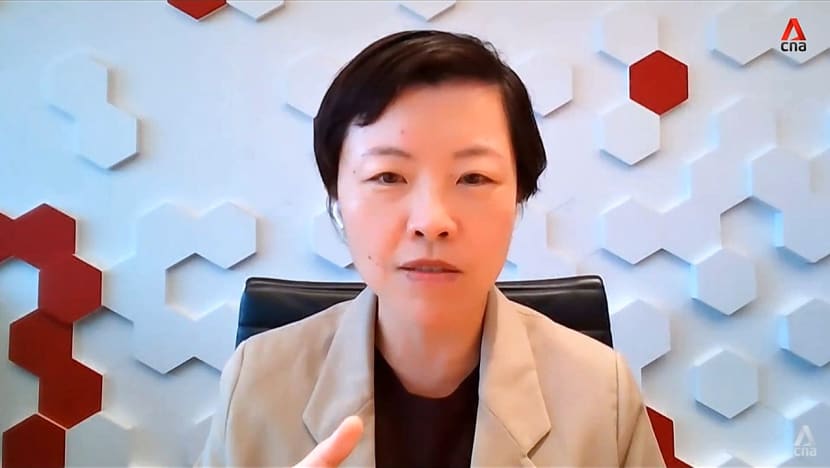
For example, 94-year-old Yeung Wai Man has settled into the Chang Xiang Hui nursing home in Foshan, a facility with Cantonese-speaking staff and meals catering for the Hong Kong palate. “Every meal has pork, fish, roast meat,” she beamed. “Delicious.”
A stay in the home includes room, board and care. It costs between HK$8,000 and HK$10,000 per month, which is subsidised for the elderly under a Hong Kong government scheme.
To encourage more retirees to cross the border, Hong Kong authorities will dole out a new HK$5,000 monthly subsidy to elderly residents on social security who move to care homes in Guangdong.
Already, eligible Hong Kong seniors in the province can have their old age living allowance of HK$4,195 a month paid there.
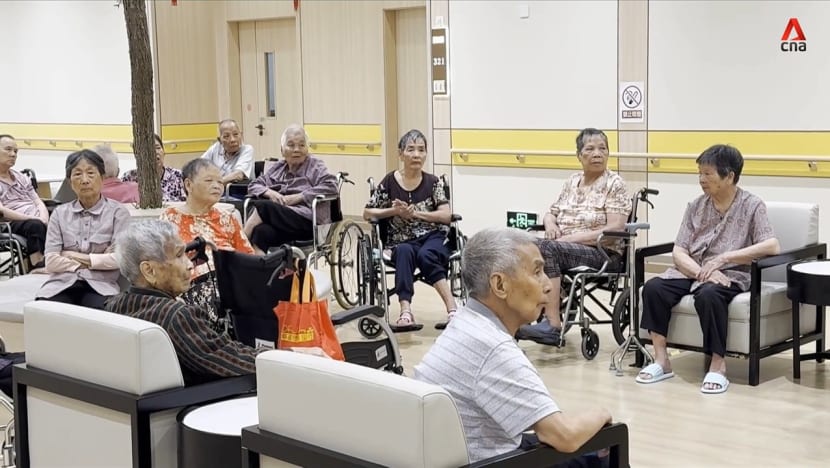
This sum is enough to cover their basic living expenses on the mainland and still leave them “extra spending money”, said Kenneth Chan Chi-yuk, chairman of Hong Kong-based eldercare provider, Hygge Living, which operates the home in Foshan.
Retirees relocating to the mainland are also seeking a better quality of life, defined by comfort. “It's definitely better than Hong Kong,” Yeung remarked. “Hong Kong has such small spaces. The apartments are very cramped.”
Lam, whose mother lived in a nursing home in Hong Kong in her old age, has seen how “even a so-called private room is just a partitioned area, not a real room”. It is not what she wants for herself.
What she mainly wants in retirement, however, is to enjoy life in the slow lane — something she feels is impossible in the bustling metropolis of Hong Kong. On the mainland, possibilities seem more within reach.

“I might be able to rent a car because it’s more economical. I could hire a driver for a day, for maybe a few hundred dollars, to take me around to enjoy the scenery,” she listed.
“If I can still walk, … living on the mainland would make me happier and possibly live longer.”
That said, she has concerns about healthcare quality. “In Hong Kong the 999 emergency services, honestly at worst, take 15 minutes to arrive. But in mainland China, I really don’t know how long it’ll take,” she said.
YOUNG AND PENSIONLESS
For many mainland Chinese, particularly the youth, funding their pensions is the retirement challenge.
Youth unemployment in China remains high, at 18.8 per cent in August. Among those who are employed, an increasing number are freelancers, which means they lack employers paying into their pensions.
One such freelancer is Leah Deng, a private piano teacher struggling to make ends meet. The rent on her apartment, which doubles as her studio, is 8,800 yuan. But her music lessons bring in only about 5,000 yuan a month.
“Since I became an independent piano teacher, I haven’t paid social security and pension (contributions),” said the 27-year-old, who graduated with a music degree four years ago. “The top priority for me is survival and trying to make a profit.”
To supplement her income, she moonlights as a dancer at a Shanghai bar from 11 p.m. to 3:30 a.m. Her commission-based salary averages about 200 yuan a night, just enough to help cover her rent.
Her total monthly earnings are about 10,000 yuan, which leaves too little for the 2,200 yuan needed every month for her pension and medical insurance.
WATCH: China’s ticking pension time bomb — When young people give up on saving for retirement (7:35)
She does not feel, however, that long-term financial goals are a necessity right now, not before she has built a career. “I don’t think … too much about (retirement) because I’m still young,” she said.
“If you have extra money, you can consider (pension contributions). If you’re like me, always short of cash, I might want to keep it in my own hands.”
Even among young people with disposable incomes, there is a general concern about the sustainability of the pension system, which relies heavily on government subsidies, said Natixis Corporate and Investment Banking senior economist Gary Ng.
The dwindling working-age population and rising number of retirees are placing immense strain on the system. According to the state-run Chinese Academy of Sciences, the public pension system is projected to run out of money within the next decade.
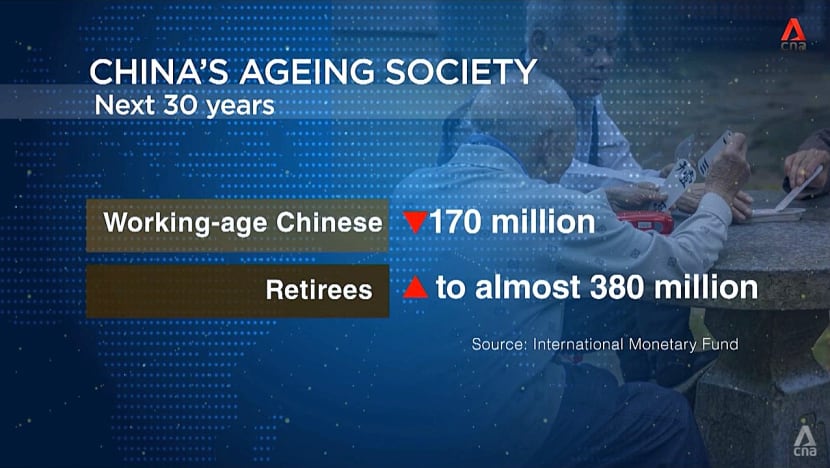
Without reforms in the next 10 years, there is a distinct possibility the youth “will need to contribute more to the system to basically make it sustainable”, Ng said.
To alleviate such pressures, the government launched a private pension scheme two years ago. This so-called third pillar of retirement savings complements the state pensions and corporate plans.
Personal wealth manager Wing Fan, 32, is one who is contributing to a personal retirement plan, aiming to save 1 million yuan by age 40. To achieve this, she must save 8,000 yuan each month on average.
“Since my living expenses aren’t very high, it isn’t too difficult. However, I do make some cuts in spending,” said Wing, who buys “fewer unnecessary items”.
It was not always like this, however. In her 20s, she often lived pay cheque to pay cheque and struggled to save.

Then she had an epiphany: “Saving doesn’t mean you need a specific (level of earnings) to start. It’s about having the determination to plan for yourself.”
RETIRED BUT WORKING
With China raising its retirement age from next January, older Chinese too must shift gears to make ends meet in retirement.
Men will retire at 63 instead of 60, white-collar female workers at 58 instead of 55 and working-class women at 55 instead of 50. The changes are to be rolled out over 15 years.
“If you have people retiring a bit later, then you don’t need to pay the pension (so) early, and also they can contribute (for) a few more years,” Ng said.
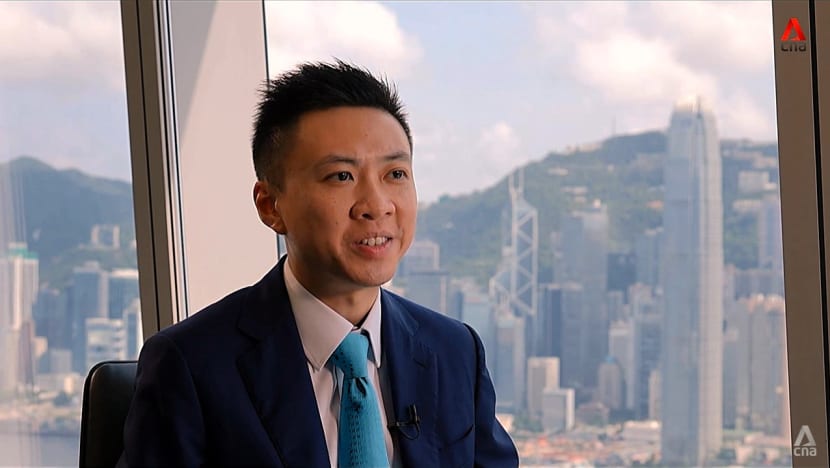
Even before this change, though, nearly 70 per cent of seniors intended to return to work after retirement, according to the 2022 survey findings of Chinese recruitment website 51job.com.
Take, for example, former truck driver Liu Chunyuan. After retiring at 55, he has spent more than a decade offering matchmaking services in public parks in Beijing to earn extra cash.
“The specific amount doesn’t matter; around 700, 800, 1,000 yuan per month would be good,” he said.
The 69-year-old receives approximately 3,000 yuan in pension benefits, which barely covers his and his wife’s monthly expenses. His 40-year-old son, a former tech worker, does not provide consistent financial support.
Hence, despite having savings exceeding 100,000 yuan, Liu continues to work to ensure he has enough for a rainy day.
“This amount … is just enough to get by,” he said. “To achieve a truly decent standard of living, it wouldn’t be enough.”
WATCH: Rethinking retirement in China — Why this retiree needs a side hustle to make ends meet (6:08)
If he is lucky enough to arrange a successful match, clients will generally give him a 1,000-yuan red packet. “The most I’ve received was a 3,000-yuan red packet,” he recalled, “(because) they later had a baby boy.”
With the extra money he earns, Liu has indulged in several short trips and one memorable holiday in Europe.
Beyond the financial benefits, however, he believes staying active is crucial for seniors in helping to fend off boredom and — something he is deeply afraid of — illness.
As with many others, perhaps, who face retirement woes, his biggest concern is not illness itself but the cost of treatment.
Watch this Money Mind special here. New episodes every Saturday at 10:30 p.m.











.png?itok=U26fscS9)


